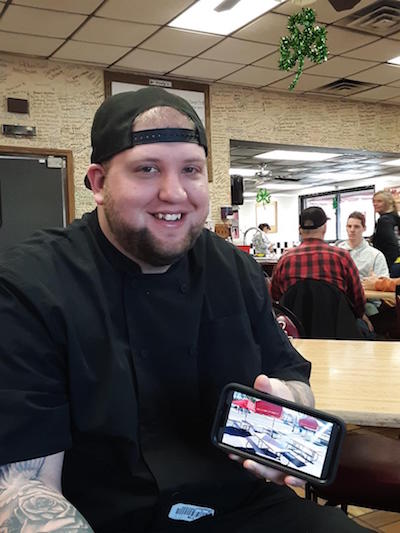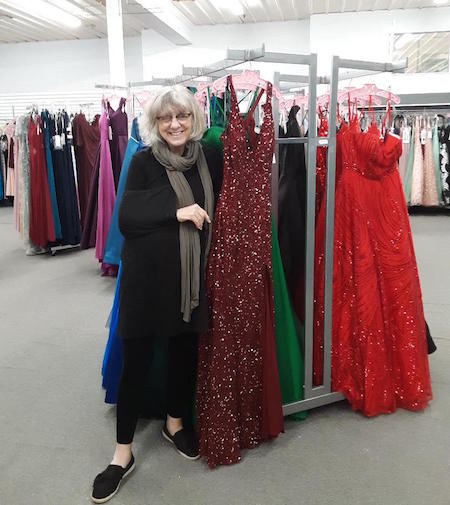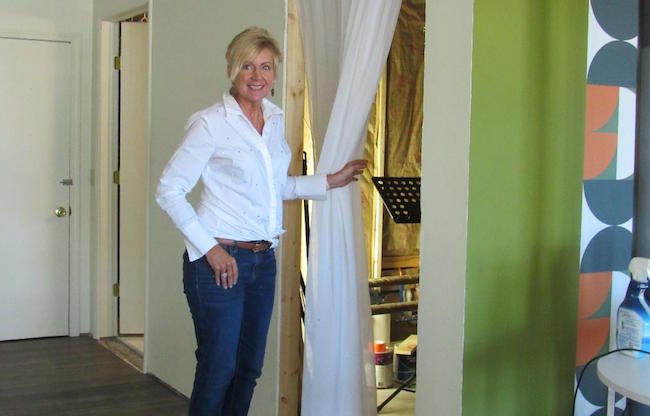Business owners adapted to survive during past 2 years of pandemic
‘The last 2 years have been an overall story about how the community came together to get through a challenging time.’

Photos by Ginny Kropf: Brody Hoffmeister, owner of Rudy’s Restaurant in Medina, shows a picture on his phone of the tables set up in the parking lot for dining during the pandemic.
Two years ago near the middle of March, life became a standstill. The pandemic not only inconvenienced the entire population and afflicted many, it wreaked havoc on businesses, forcing some to shut down and others to adapt to remain in service.
In Medina, when the pandemic hit Brody Hoffmeister, 25, had just taken over the family restaurant, Rudy’s, after his mother Kelly Russo passed away.
“I was just starting to move forward,” Hoffmeister said. “I didn’t have a plan, but I knew what worked.”
At the time, Rudy’s employed 25 people. Now they are down to 10.
“The pandemic changed the game,” he said. “It’s pretty hard to move forward in a world where everything is against you.”
Rudy’s closed on March 21, 2020.
With the help of his brother, sister, wife, dad and his girlfriend and five or six employees, Rudy’s re-opened April 1 with shorter hours and a downscaled staff.
Hoffmeister came in at 5 a.m. to unload trucks, stock the steam table and set up for the day before manning the grill. The restaurant was open from 11 a.m. to 7 p.m. for takeout only.
“I used all the analytics Mom left me,” Hoffmeister said. “I figured where I could cut corners, but if it wasn’t for my family, I’d never have survived.”
Next, Hoffmeister, who had been planning to redo the restaurant in retro similar to when his grandparents were there, set up the tables in the parking lot and rented parking space at the former Moose building.
“This was personal to me,” he said. “I was not only fighting for my business, but for all the childhood memories of growing up here. There were days I wanted to give up. This has been a humbling thing.”
Hoffmeister said they lost a lot of customers, but persevered. He got an economic disaster loan to buy food.
“That’s what saved me,” he said.
Then they started to offer Door Dash, a third-party company which delivers the food.
“I cook and package it and they deliver if for a percent of the cost,” he said.
On Friday nights Hoffmeister said they used to go through 150 pounds of fish, but during the pandemic, the number dropped to 70 pounds.
“We were at 50 percent of capacity, but we kept going,” he said.
On June 11, 2020, they re-opened for indoor dining at 50 percent capacity.
It wasn’t until May 2021 Rudy’s was able to open at full capacity, and then with shorter hours and less employees. Visit our website.
The Shirt Factory Café across the street from Rudy’s was on a high, having just won the Best Bloody Mary at the Riverfront in Buffalo, when everything went down, said Alix Gilman, who owns the Shirt Factory with husband Scott Robinson.
“It was such a turbulent time for the whole community. Advisories and mandates changed by the moment,” Gilman said. “No one knew if and when we would reopen.”
Robinson said Double Dips Ice Cream had just received their opening supply of ice cream and were going to be stuck with it, so the Shirt Factory stepped in and bought that ice cream.
“We went online to offer takeouts and immediately added their ice cream to our menu,” Gilman said. “We soon got rid of their pints, saving them from a loss. There was not a business in this town that wasn’t supportive.”
The biggest issue for the Shirt Factory was when they could reopen on a limited basis, they were so small they couldn’t provide spaced-out seating.

Jaye Sullivan from Blissett’s in Medina shows some of the gowns in her shop. While weddings were called off during the pandemic, prom dresses still sold, she said.
“There was no way we could open and had to stay completely closed,” Gilman said. “Scott and I both had other jobs and we couldn’t leave the responsibility to employees. It was such a divisive time.”
Their bar was able to be open in summer, but it would more than a year before they could reopen like normal.
Blissett’s Specialty Shop on Main Street in Medina closed completely for two months, then reopened on June 1, 2020. It was uncertain how much business a shop would do which sold wedding and prom dresses, when proms and bigger weddings were canceled.
No one knew everything would be closed, said Blissett’s owner Jaye Sullivan.
When she closed the day after St. Patrick’s Day, she thought it would be for a couple of weeks or maybe a month.
“So I didn’t panic,” she said.
People still got married in small ceremonies and although there were no proms, they still ordered prom dresses.
At first there were no shipping problems. Sullivan said the prom companies ordered fabric in March to cut for the following year. Anyone trying to buy a prom dress that following March found slim buying, she said, but bridal companies just kept making gowns.
“Last year was one of the busiest for wedding gowns in five years,” Sullivan said.
Sullivan opened for appointments only and posted merchandise online. She said people would order online, pay for it by credit card and then she would bag the order and set it in the doorway for them to pick up. Now she does all her formal wear by appointment only.
Furniture and appliance dealers soon felt the impact of the pandemic.
Frenchy Downey, who runs Frenchy’s TV and Appliances on Ridge Road in Albion, said this was the most difficult and challenging time since he went into business in 1964.
“I got down to only five appliances in my store,” Downey said. “People were calling me from out of state looking for appliances. It was two and a half months before I could get a thing, and now I can’t get parts.”
He said the situation is really serious, and he has never seen prices go up as fast as they are now.
“It used to be the companies who made appliances also made the parts, and then they started outsourcing them,” Downey said. “They found parts could be made cheaper in other countries, but when the pandemic hit, they couldn’t ship them. Now they are shipping them and there’s no labor to unload them, so they sit on a boat in the harbor.”
Downey recently took apart a range and found parts made in five different countries.
“The whole business is coming to a ‘whoa,’ and I don’t see it improving,” he said.

Amy Sidari, owner of Gotta Dance Studio and the Cabaret at Studio B in Albion, stands in her newly remodeled studio nearing the end of the pandemic’s restrictions.
When the order to close was issued, Amy Sidari of Gotta Dance and the Cabaret at Studio B in Albion thought it would be for one to two weeks.
“I never imagined it would be October 2020 before I could open back up,” she said.
In the meantime, she began posting games, puzzles and dances online for her students to keep active and connected.
Then she opened a chat room for parents and children. In June 2020, when she still couldn’t hold classes or recitals in her studio, Sidari planned a recital on the front lawn of her home. Parents parked in around the lawn and watched from their cars. She spray painted lines on the grass to keep students separated as they danced.
“I just wanted to do something for fun and get the kids moving,” Sidari said.
When she was allowed to open on a limited basis, Sidari devised a program at her studio where she divided a room into compartments each family could share and do exercises. She invited in speakers from various areas, such as exercise, makeup techniques, art lessons and journalism to educate her students in small groups.
As she was able to slowly ease into the theater scene, she planned small cabaret sessions for 15 guests.
Now finally able to return to normal, Sidari is operating out of three studios, but she keeps classes small and still insists on using sanitizer.

Marc Shurz
The pandemic hit the medical field particularly hard.
“The last two years have been an overall story about how the community came together to get through a challenging time,” said Marc Shurtz, CEO/CIO of Orleans Community Health. “Area businesses donated food, personal protective equipment, N95 masks and more to our team at the hospital, while front line workers fought through fear to provide care back to the community.
“There were many difficult decisions that needed to be made over that period, but limiting visitation was and is one of the hardest. While we’ll continue to focus on the health and well-being of our team, patients and the community, we’re also looking forward to the day we can put all of these limitations aside.”
“Providing ease and comfort to the community was our priority, and we did so by conducting more than 30,000 Covid-19 tests over the last two years,” said Nikki Helsdon, practice manager of the Albion Healthcare Center.”
Albion altered operations by adapting to Covid-19, Helsdon said.
“We met demands while also making sure we provided comfort to our patients and the community,” she said. “We installed a drive-thru shed to avoid possible exposure to the public. Our employees bravely conducted the testing through all kinds of weather and shortage of staffing, due to the pandemic. The public was able to schedule over the phone, drive up, get swabbed and results were called to them within the hour.”
Helsdon said their workload changed significantly, due to high demand of calls, tests and state reporting, not including scanning and charting.
“We are happy to say we made it through over 30,000 tests and will be there for the public at any time they may need us,” she said. “As overall numbers have continued their steady decline, we’ve been able to place more focus on everyone’s overall health and wellness.”





































































